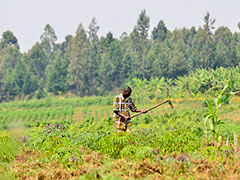Motivation
In spite of its promising agricultural potential, the Democratic Republic of Congo (DRC) has the highest rate of malnutrition in the world. DRC possesses 80 million hectares of arable land, though less than 10 percent are used for farming purposes. If farmers cultivated this land to grow more rice and maize, the country would have the ability to both sufficiently feed itself and become a net food exporter. Many believe that encouraging local food production is the only way for the DRC to create a food system that can feed the country’s entire population.
In 2008, DRC’s Prime Minister’s office approached IFPRI to design a strategy to address the impacts of the global food price crisis on the country. That same year, IFPRI held a conference on food security, attended by IFPRI senior researchers and government experts that resulted in the 2009-2011 Agricultural Capacity Development and Regional Research Linkages Program, supported by USAID. The program supported the national CAADP process and established a system of monitoring and evaluation to better gauge the development impacts of such efforts on the agricultural sector. In this way, it assisted DRC in strengthening both institutional and human capacity in the sector. With support from USAID, IFPRI research has shown that by investing in rural infrastructure, extension services, agricultural research, science, and technology, the DRC can tap into its abundant land resources to self-sufficiently feed its population. An IFPRI researcher also serves as an advisor to the office on food and agricultural issues, supporting the government in its food security and poverty reduction activities.
Outcomes
- Influenced by IFPRI’s research, the government of the Democratic Republic of Congo approved a program to strengthen the capacity of the Ministry of Agriculture.
- IFPRI hosted a conference on agricultural extension and assisted in drafting a national policy on extension services. As a result of this collaboration, the government of DRC is initiating a $3 million Agricultural Innovation Fund, with technical assistance from IFPRI and IITA.
- In the context of the CAADP process, IFPRI was commissioned to assist provinces in designing regional investment plans totaling approximately US$55 million. The provincial plans will be aggregated to become the country’s national agricultural investment plan.
- As part of the CAADP process, IFPRI also assisted in the preparation of the 2013-2020 National Agricultural Investment Plan with growth options analysis.
- IFPRI conducted research on agricultural extension and a multistakeholders platform to be used by the International Fund for Agricultural Development and USAID in their projects on agricultural value chains.
- IFPRI’s work on food-nutrient deficiency provided input in the World Food Programme’s country report/food security assessment on DRC.
- The institutional mapping analysis of the agricultural decisionmaking process conducted by IFPRI is the basis for the upcoming government capacity-building program for the agricultural sector.



